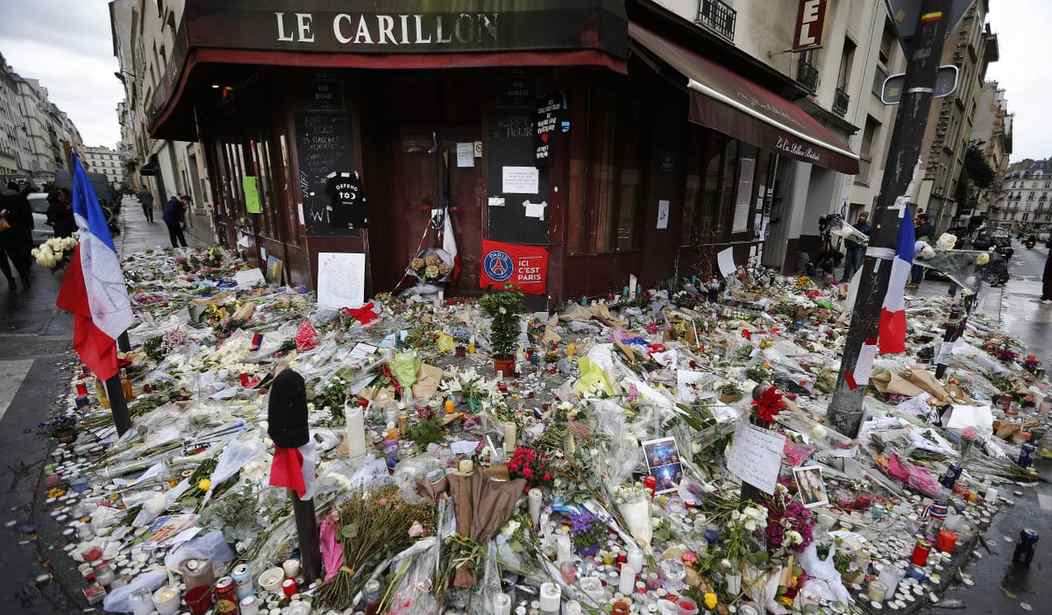Last Friday, the word “Paris” acquired a new meaning, like “World Trade Center” and “9/11” did a few years ago. An organized attack by three squads of Daesh irregulars killed 130 people and wounded hundreds of others, some of them critically.
Within hours, we heard from the political class that there had been “intelligence failures” that allowed the attacks to succeed, while the usual suspects were already running stories saying that the U.S., German, and French governments knew about the attacks in advance and did nothing. (And, of course, at least one consummate ass explained that the U.S., German, and French governments were complicit because it fit with the plans to establish a new world order on the back of hysteria.)
I don’t think there’s any way to prevent this same trope coming up now and in any similar attack in the future. So let’s see if we can understand what these “intelligence failures” are.
I’ve written about the intelligence process before, but the basic outline is that all intelligence is a four-step process: raw data is acquired by a bunch of different means, and then organized by putting it into a form that can be searched, sorted, and collated in a bazillion different ways. When I was in the IC, I was out on that collection front end. Once intelligence is collected, it goes to analysts who search, sort, and collate, and produce reports that are used in a thousand different ways. (John Schindler at XX Committee was in analysis and is an excellent course on all things intelligence.)
One of the products of the analysts’ work is a final summary that goes to POTUS — a short memo called the Presidential Daily Briefing (PDB). (There’s an example of part of a PDB here.) One of the more controversial PDBs of recent years was the PDB on bin Laden’s activities that was delivered to President George W. Bush on August 8, 2001. CNN published a leaked transcript here. This became the usual source used to claim that Bush was warned about the 9/11 attacks and did nothing. But looking at the actual transcript, what was really there were these points:
- bin Laden wanted to attack the U.S. mainland (Well, duh. Everyone with a room-temperature IQ not hampered by an anatomically unlikely cranial impairment knew that, and had known that since the first World Trade Center attack in 1993.)
- Various sources said there were al Qaeda operatives in the U.S.
- bin Laden had suggested aircraft hijackings might be used (but not where or how).
- It appeared federal buildings in New York City had been surveyed as possible targets.
This actual information became the basis for two political narratives: on the one hand, that “intelligence failures” kept the 9/11 attack from being prevented, and on the other hand, that the Bush administration had let the attack proceed, either by incompetence or actual malice.
What it actually shows us is what an “intelligence failure” really looks like. It’s very rarely true that there were no warnings at all of any successful attack; it’s almost always true that we had good intelligence, but not actionable intelligence. We knew that bin Laden and al Qaeda wanted to attack the U.S. (again). But no one knew that, among all the hundreds of thousands or millions of people who came to the U.S. from the Middle East, Mohammed Atta and 18 others planned to attack on September 11.
Was it an intelligence failure? You have to say yes, by definition. If only we had found out exactly who was involved, the 9/11 attack could have been stopped and we would have called that an intelligence success. (Although, in all probability, then we’d have heard little or nothing about it.)
So now let’s think about Paris. We know that at least one of the killers was already on a terrorist watch list in France. We also know that the Germans stopped a carload of Kalashnikovs on the 5th, and the smuggler is now suspected to be connected to the Paris attacks. We’re already hearing that the U.S., France, and Germany were “warned in advance” and that “intelligence failures” were responsible for the attacks succeeding.
We need to remember that, by definition, a successful attack is an intelligence failure — from Paris, to 9/11, to Pearl Harbor, and on back to when Moonwatcher surprised the other man-ape with a tapir’s thighbone. Which means, saying it was an “intelligence failure” tells us nothing — it’s just a way for a press operative to blame someone, anyone.
Pushing the blame onto intelligence failures, however, ignores the fact that depending on intelligence to stop attacks that are already in process is a mug’s game — it can never work completely. If we want to really stop these attacks, we have to stop them the way wars have always been fought: by making the attacks too expensive for the people directing them. Until we accept this, we can expect more “intelligence failures” as far as the eye can see.










Join the conversation as a VIP Member